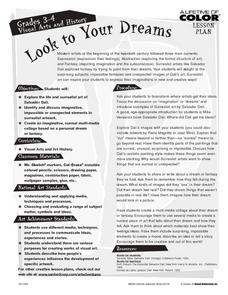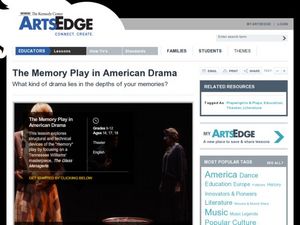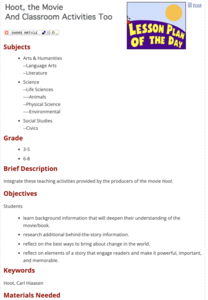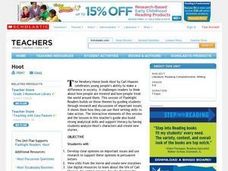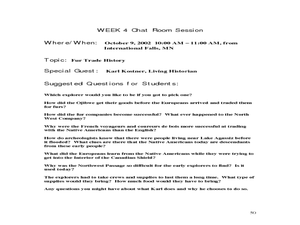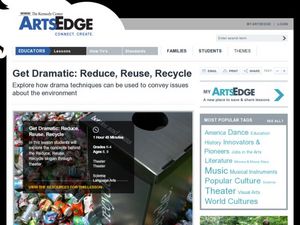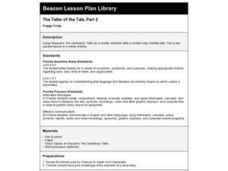Curated OER
Ballet and Classical Music
Fourth graders explore ballet. For this dance and music humanities lesson, 4th graders practice ballet positions and play a card game using French ballet vocabulary. Students count beats in rhythm patterns and listen to classical music...
Prestwick House
Poe’s “The Raven” – Unity of Effect
How do Poe's choices of imagery, rhythm and rhyme scheme, and structure help build the desired single effect of "The Raven"? After listening to a dramatic reading of the poem, class members consider whether Poe's choices do...
Perkins School for the Blind
Memory
When you are blind, your hands become your eyes, so learning how to discriminate between various objects through touch is a very important skill. Make a memory game by gluing common items onto cardstock. The kids feel, identify, and...
National Endowment for the Humanities
Vengeful Verbs in Shakespeare’s “Hamlet”
It's time for pupils to read, examine, and contemplate literature to explore the difference between vivid and generic verbs. Pupils distinguish between the two types of verbs as they read the ghost scene from Shakespeare's Hamlet. They...
Curated OER
Crayon Etching- Medieval Bestiary
Sixth graders make connections between art and literature studying about Medieval imagery and beliefs.
Skyscraper Museum
What is a Skyscraper?
Skyscrapers are amazing feats of architectural design that create the iconic skylines of the world's biggest cities. Young architects explore the defining characteristics of these monstrous towers with the first instructional activity in...
Curated OER
Field of Dreams
Young scholars study several of Marc Chagall's paintings with an emphasis on his use of symbolic color and of space. They explore learn basic techniques for using Scholar colored pencils, and create an artwork using a baseball theme.
Curated OER
Look to Your Dreams
Students research the life of surrealist artist Salvador Dali and create their own "surreal" art in the form of a collage, based upon their dreams or fantasies.
Curated OER
Transportation Math
Students use mathematical operations to examine truck drivers and the math they use everyday. In this transportation math activity, students read word problems that relate to transportation and the math needed to solve the word problems....
Curated OER
The Memory Play in American Drama
Students take a closer look at a memory play. In this American drama lesson, students read Tennessee Williams's The Glass Menagerie and analyze it as a memory play. Students discuss the linear and non-linear aspects of the play prior to...
Curated OER
Hoot, the Movie And Classroom Activities Too
Students complete various activities for the book and movie "Hoot." They read and analyze the novel, observe wildlife in their neighborhood, and compare/contrast Henry David Thoreau with a main character in the book.
Curated OER
Being in the Noh: An Introduction to Japanese Noh Plays
Students read a Japanese Noh play and discuss its structure and traditional characters. They choose a short myth and write a Noh play based on it.
Curated OER
Making Inferences While Identifying Similes and Metaphors
Use this lesson to study similes and metaphors and the inferred meaning. In this language arts lesson, 5th graders write their own similes and metaphors. A worksheet is provided for extension work or to check understanding as homework.
Curated OER
Creating Transitions
Fourth graders analyze the use of transitions in text. In this transitions lesson, 4th graders determine how and why a transition is used at a specific time in a piece of writing. They show transitions by using movements before...
Curated OER
So Foul and Fair a Play
Students watch various interpretations of Shakespeare's Macbeth in film. In groups, they examine the setting, characters, music and sequence. They compare and contrast the various films and discuss the differences. They write an essay on...
Curated OER
Censorship In Fahrenheit 451
Tenth graders explore the concept of censorship through a reading of Fahrenheit 451. They discuss the issue and its relation to contemporary society. Students work in groups to debate the pros and cons of censorship in our society.
Curated OER
Writing Myths
Students read and write myths. In this world mythology instructional activity, students read and analyze myths from various cultures and then recognize their attributes as they write their own myths that explain natural phenomena.
Curated OER
"Hoot" by Carl Hiaasen
Students complete a variety of activities that revolve around the book "Hoot" by Carl Hiaasen. They view and discuss stills from the move "Hoot" and compose original storylines, conduct Internet research about the life of Carl Hiaasen,...
Curated OER
Songs, Myths and Games
Fourth graders recognize that the Ojibwa lived in a serene environment which shows in their legends. In this songs, myths and games activity, 4th graders recognize characteristics of the Ojibwas culture through the study of their games,...
Curated OER
Recalling History by Pulling Strings
Students investigate the role and nature of story-telling as it preserves history and culture and discuss how puppetry serves as an effective method of presentation. They create basic outlines for puppet shows that relay important...
Curated OER
Globe Trotting Cinderella
Students explore the fairy tale genre of literature. In this Cinderella lesson, students read fairy tales and discuss their attributes and cultural background. Students examine and write their own fractured fairy tales.
Curated OER
Me: A Visual Essay
Students familiarize themselves with photo editing and montage techniques. They create a montage that tells the viewer about themselves.
Curated OER
Get Dramatic: Reduce, Reuse, Recycle
Students explain reducing, recycling and reusing. In this science/ arts lesson, students create a commercial and display a backdrop made out of recycled goods. Additionally, students write written responses to writing prompts.
Curated OER
The Teller of the Tale, Part 2
Students discuss character types and their qualities. They select two characters and write about their dress, speech, habits, attitudes and beliefs. They write a monologue as the characters presenting a moral theme.







